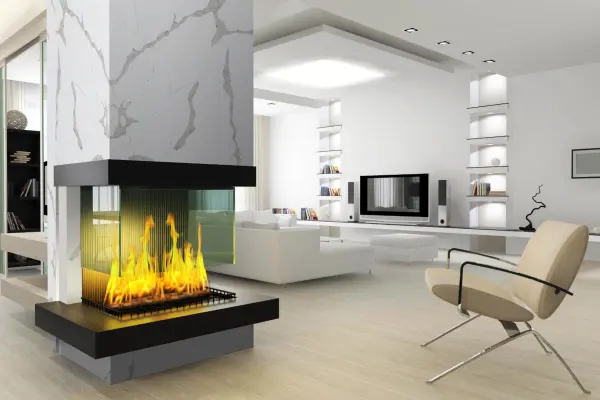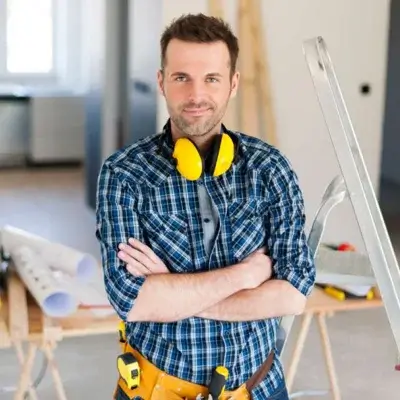The home hearth is a magnet for family warmth. Modern designers have long moved beyond traditional wall-mounted placement. In one project by French architect Dominique Imbert, a suspended structure hangs in the center of the room, rotates 360°, and creates the effect of floating fire. This fireplace design was recognized as "the most beautiful object in the world" by the international Pulchra Design Awards competition.
US Census Bureau statistics show that about 40% of homeowners have a fireplace in their living room or a similar element to create a warm atmosphere. But only 15% use unconventional fireplace ideas in their design. This article will reveal the most creative and practically implementable solutions for revolutionary fireplace design.
From suspended structures to fireplace dividers, from futuristic materials to intimate solutions – each idea is backed by real examples and technical details.
Suspended Fireplaces: The Art of Fire Levitation
Suspended hearths have revolutionized the concept of home heat placement. The first ceiling-suspended structure was created in 1968 in France by humanities teacher Dominique Imbert and is still exhibited in the Guggenheim Museum, the Museum of Contemporary Art in Bordeaux, and the National Center for Contemporary Art in Grenoble.
Sphere Fireplace with 360° Rotation
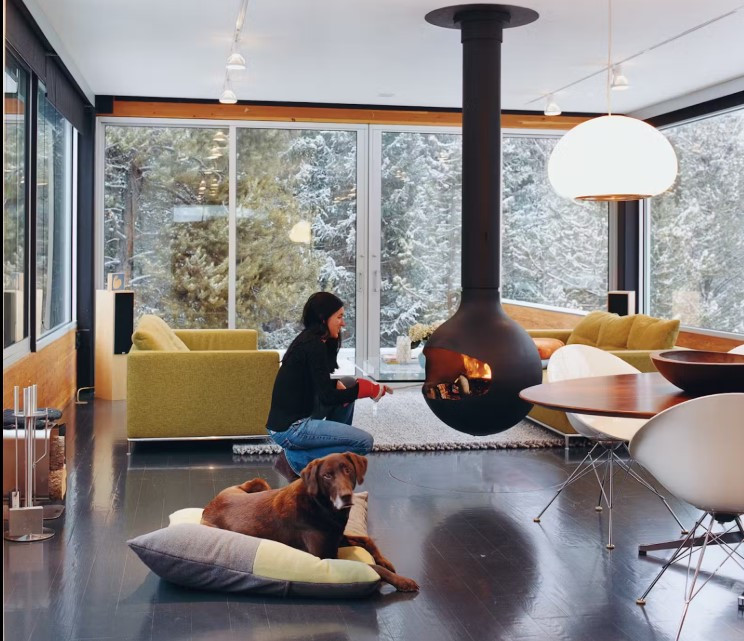
Gyrofocus is a legendary model that can rotate around its axis. The sphere diameter is 90 cm, weight is about 130 kg. The structure is suspended from the ceiling on a steel cable and allows directing heat to any side of the room.
"A suspended hearth frees up all floor and wall space. In one project, we placed Gyrofocus in the center of a two-level living room – now the fire is visible simultaneously from the kitchen, dining room, and lounge area. The effect is stunning." – David Guerra, architect.
Installation requires reinforcement of ceiling beams and a special chimney. The cost of a complete kit starts from $15,000.
Cone Suspended Fireplace
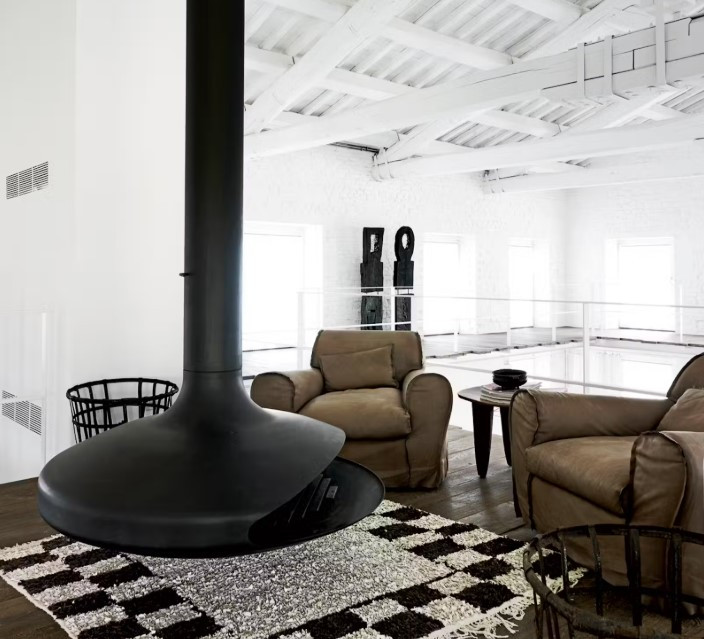
Cone models create a sense of futurism in the interior. They are installed in room corners, allowing for a gallery wall behind the structure. In practice working with private clients, I often use this solution for mid-century modern style homes.
The cone shape optimally distributes heat, and the suspended structure doesn't take up useful space. The model is suitable for rooms with ceiling heights from 3 meters.
Fireplace Decor with Laser Cutting
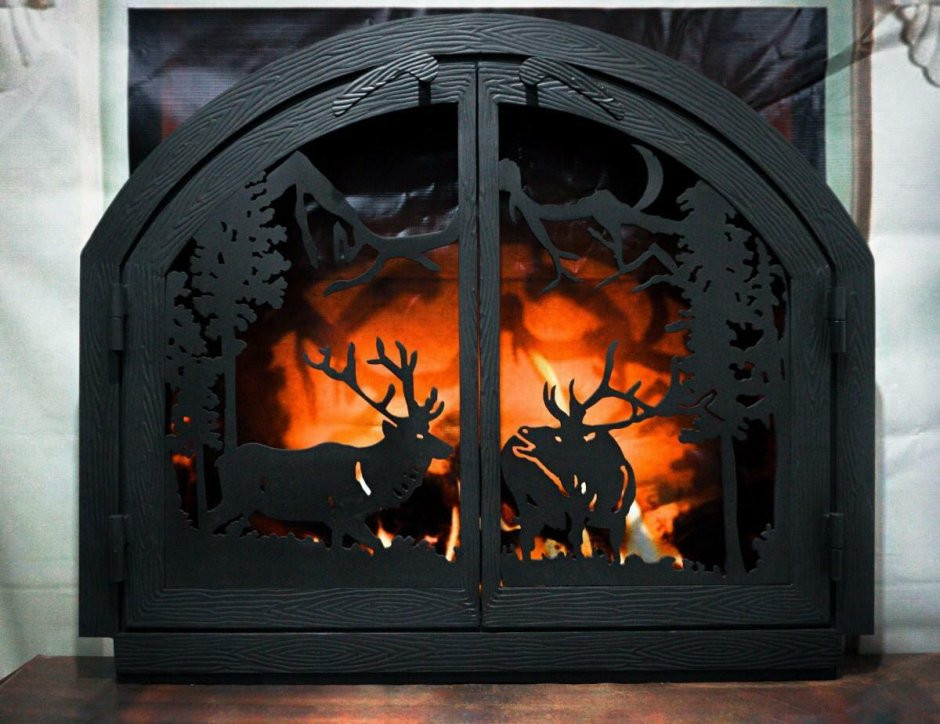
Metal fireplace doors with laser cutting transform an ordinary hearth into an artistic object. The silhouette of deer and trees creates the effect of a dimensional picture against the backdrop of flames, adding depth and atmosphere.
Such decor performs not only a decorative but also a functional task: it protects the space from sparks and coals while remaining a stylish interior accent. Perfectly suited for chalet, country, or classic country interiors where cozy atmosphere and natural motifs are valued.
Fireplace Dividers: Zoning with Character
Double-sided hearths solve the task of space zoning while maintaining visual connection between zones. Modern technologies allow creating structures of any complexity.
Asymmetric Fireplace Portal with Cubes
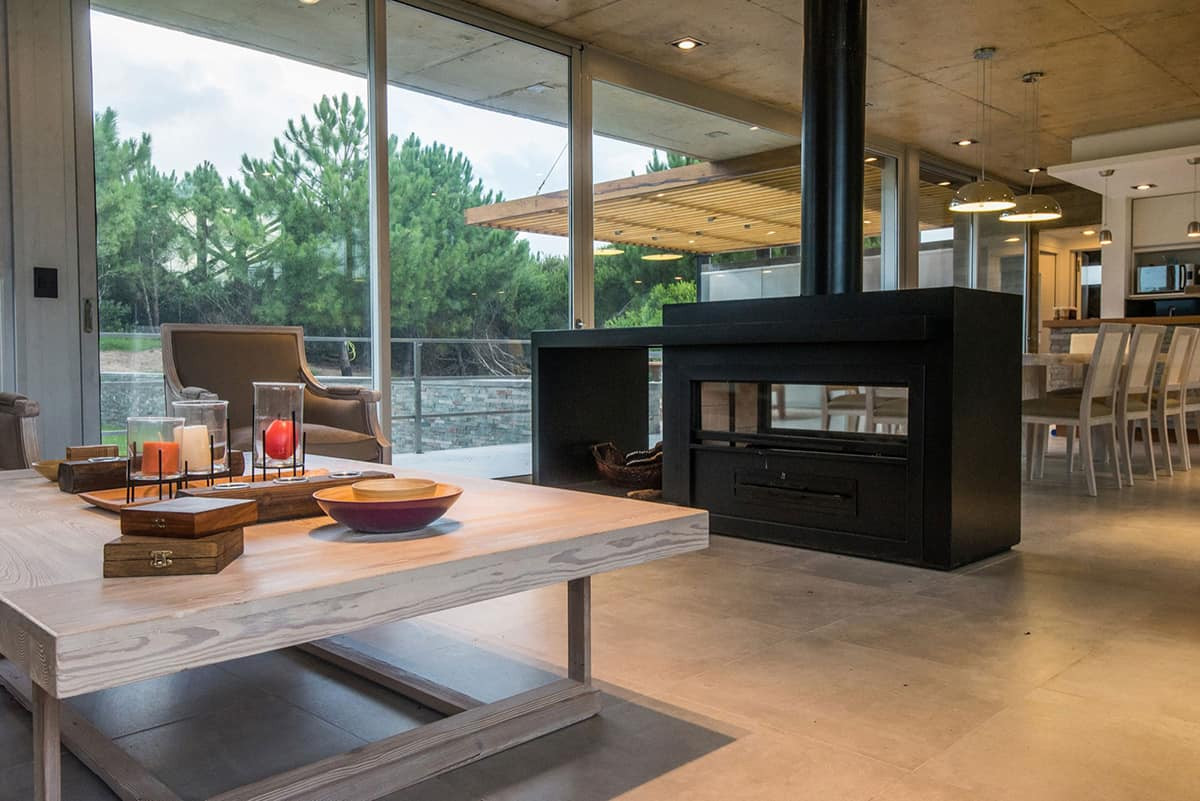 An innovative solution from Argentine studio Estudio Galera: two separate cubes – one for fire, the second for wood storage. The asymmetric placement of the firebox creates a dynamic composition.
An innovative solution from Argentine studio Estudio Galera: two separate cubes – one for fire, the second for wood storage. The asymmetric placement of the firebox creates a dynamic composition.
The cubes are made from different materials: the fire block from refractory concrete, the wood block from aged metal. This way, functionality combines with visual interest.
Column Fireplace with Built-in Wood Storage
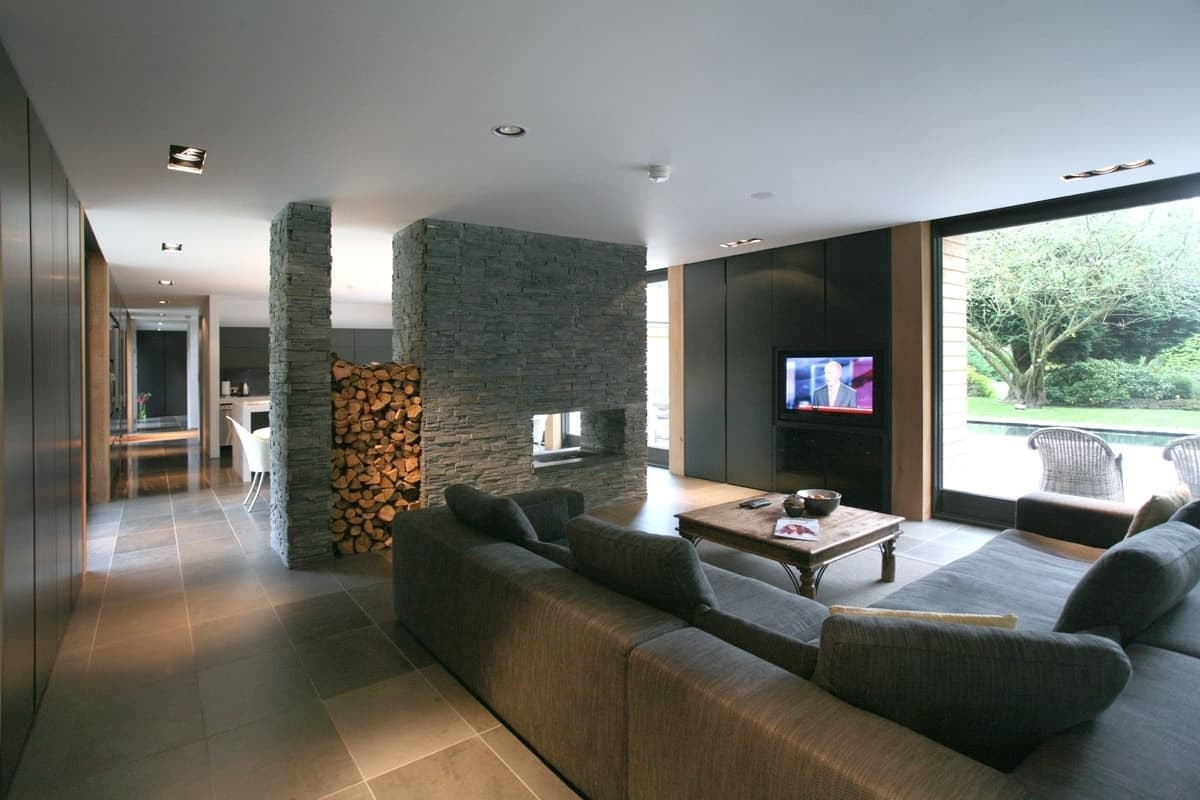 Solution from Nicolas Tye Architects: a vertical column of natural stone serves simultaneously as a chimney and wood storage. When filled with wood, it creates an effective contrast of textures and colors.
Solution from Nicolas Tye Architects: a vertical column of natural stone serves simultaneously as a chimney and wood storage. When filled with wood, it creates an effective contrast of textures and colors.
The structure works as a sculptural element even when turned off. On one object last season, we used a similar solution in a 200 sq.m house – the result exceeded the client's expectations. *Source: https://www.trendir.com/fireplaces-as-room-dividers-15-double-sided-design-ideas/*
Glass-Concrete Partition
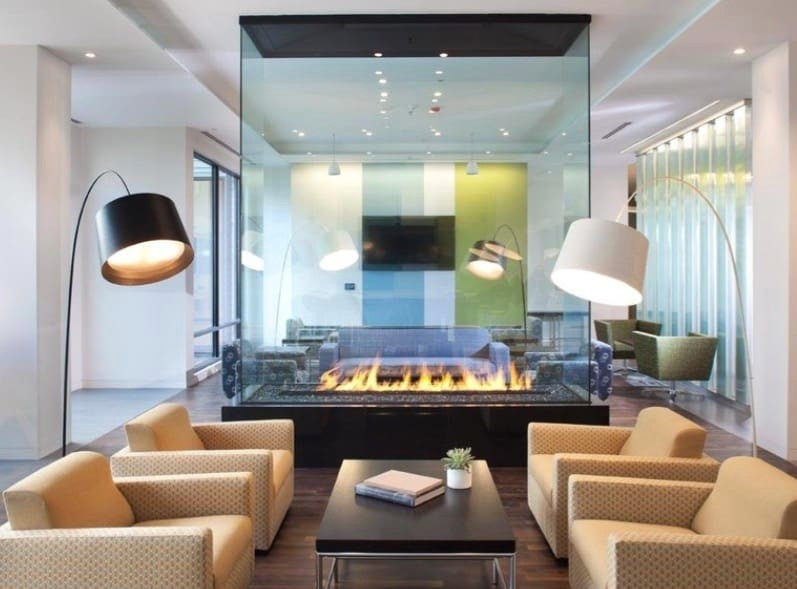 The combination of concrete and glass creates an industrial-minimalist aesthetic. Glass panels allow maintaining visual permeability of space, while the concrete base provides necessary massiveness.
The combination of concrete and glass creates an industrial-minimalist aesthetic. Glass panels allow maintaining visual permeability of space, while the concrete base provides necessary massiveness.
Suitable for lofts and modern country houses. Considering structural features, it requires quality ventilation and a professional approach to insulation.
| Type of Suspended Fireplace | Room Area | Ceiling Height | Installation Cost |
|---|---|---|---|
| Gyrofocus (sphere) | From 40 sq.m | From 3.5 m | $15,000-25,000 |
| Cone | From 25 sq.m | From 3 m | $8,000-15,000 |
| Drop | From 60 sq.m | From 4 m | $12,000-20,000 |
| Bubble | From 30 sq.m | From 3 m | $10,000-18,000 |
The presented table will help choose the appropriate type of suspended fireplace depending on room parameters.
Revolutionary Materials in Fireplace Construction
Modern materials open unlimited possibilities for creativity. From gradient glass to ceramics that withstand 1400°F.
Gradient Glass Panels
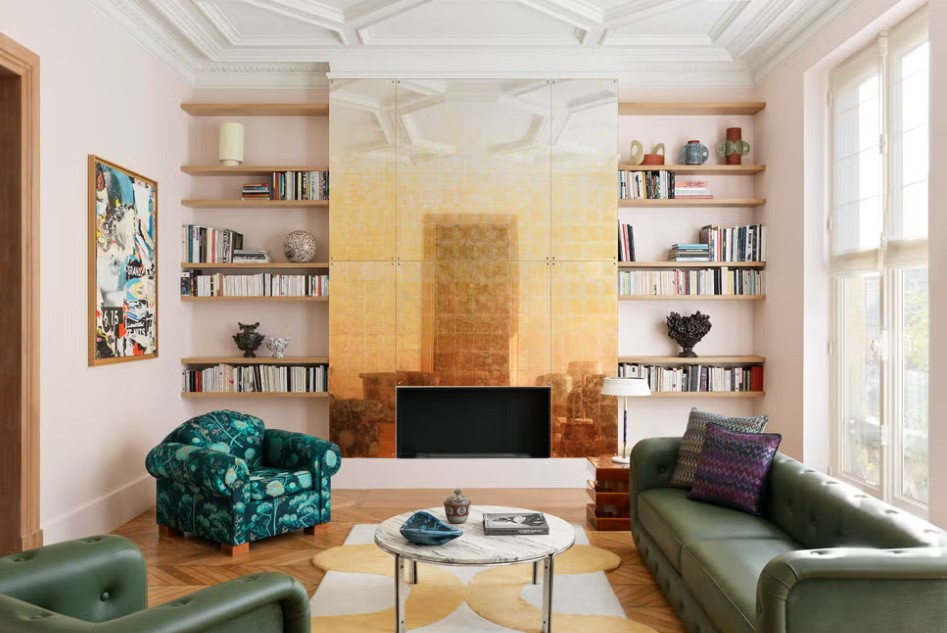 Designer Pierre Gonalons created a fireplace wall with gradient glass panels covered with copper, brass, and silver foil. The "burnt mirror" effect in the lower part creates an illusion of fire's impact on the material.
Designer Pierre Gonalons created a fireplace wall with gradient glass panels covered with copper, brass, and silver foil. The "burnt mirror" effect in the lower part creates an illusion of fire's impact on the material.
The technique requires special tempered glass and professional installation. It's known that such a solution increases project cost by 2-3 times, but the result becomes a work of art.
Millegrain Plaster
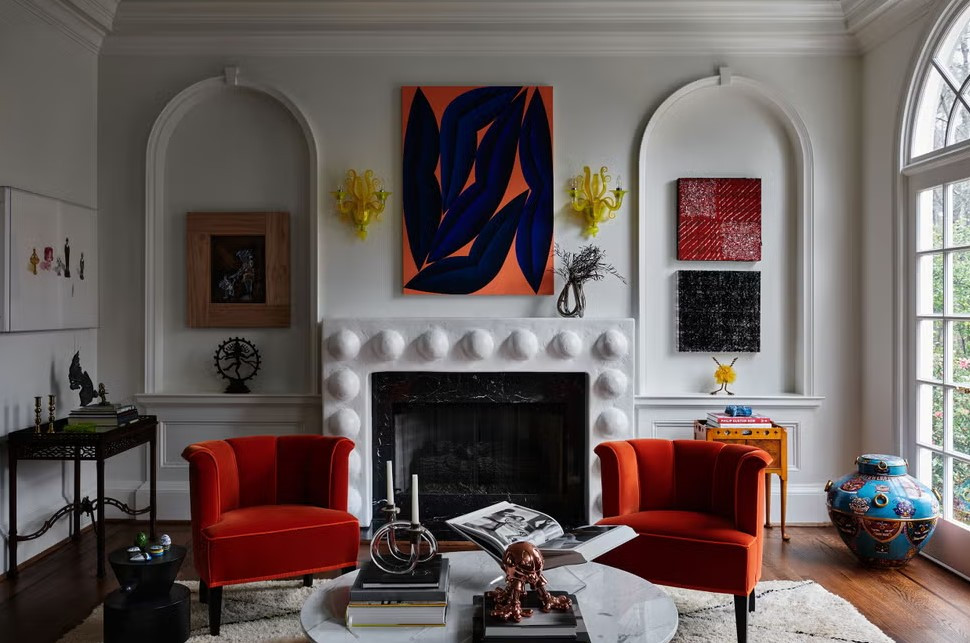 The bead texture of millegrain transforms simple plaster into a decorative masterpiece. The technique is borrowed from jewelry making – thousands of small spheres create a tactile surface.
The bead texture of millegrain transforms simple plaster into a decorative masterpiece. The technique is borrowed from jewelry making – thousands of small spheres create a tactile surface.
In one recent project, we used this technique for a portal in an Atlanta mansion. The surface plays with light from the flames, creating constantly changing visual effects. *Source: https://www.elledecor.com/design-decorate/room-ideas/g3388/fireplace-ideas/*
"Modern materials allow creating surfaces that interact with fire not only functionally but also visually. Gradient panels and textured plaster transform the fireplace into an interactive art object." – Jessica Davis, interior designer.
Fireproof Glass Ceramics: Operating Temperatures
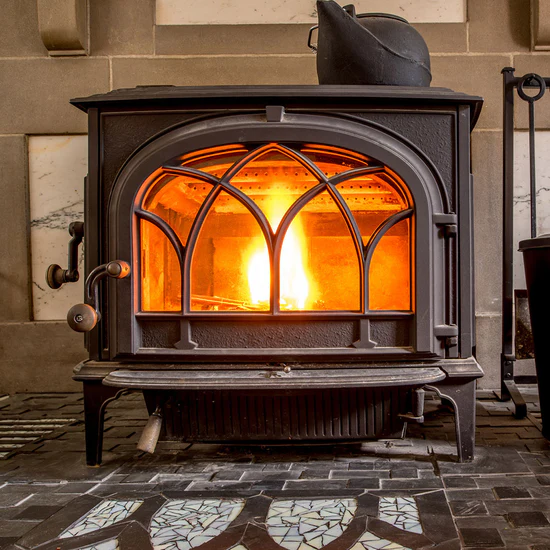 Fireproof glass ceramics withstand operating temperatures up to 540°C (1000°F) – significantly exceeding the capabilities of ordinary tempered glass, which breaks from thermal shock at just 200°C. The material allows creating completely transparent fireboxes without risk of cracking.
Fireproof glass ceramics withstand operating temperatures up to 540°C (1000°F) – significantly exceeding the capabilities of ordinary tempered glass, which breaks from thermal shock at just 200°C. The material allows creating completely transparent fireboxes without risk of cracking.
Pyroceram, NeoCeram, and Robax are three main types of glass ceramics. All have similar operating characteristics around 540°C but differ in maximum short-term exposure temperatures. Suitable for high-temperature applications in wood-burning fireplaces. In practice, I often notice that owners underestimate the importance of quality glass, which leads to operational problems.
Architectural Solutions and Spatial Effects
A fireplace can dramatically change the perception of space. Proper placement and design create focal points and direct movement in the room.
Ribbon Fireplace with Tile to Ceiling
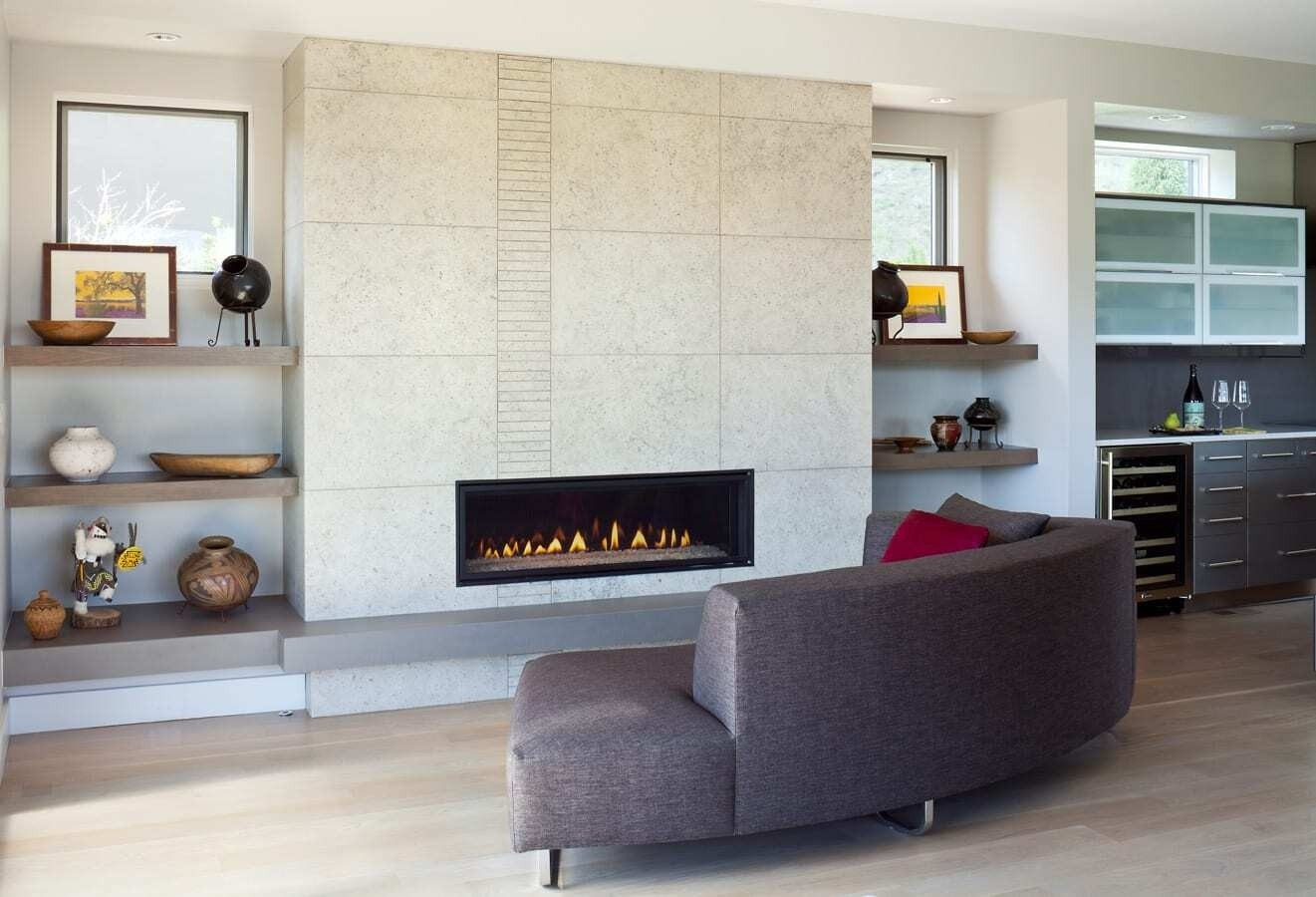 In a modern silo, architects created a ribbon fireplace with cladding to the sloped ceiling. The raised base stretches from wall to wall, providing space for storing accessories and books.
In a modern silo, architects created a ribbon fireplace with cladding to the sloped ceiling. The raised base stretches from wall to wall, providing space for storing accessories and books.
Such a solution visually increases room height and creates the impression of a continuous vertical. It should be noted that installation requires reinforcement of load-bearing structures.
Asymmetric Mosaic Cladding
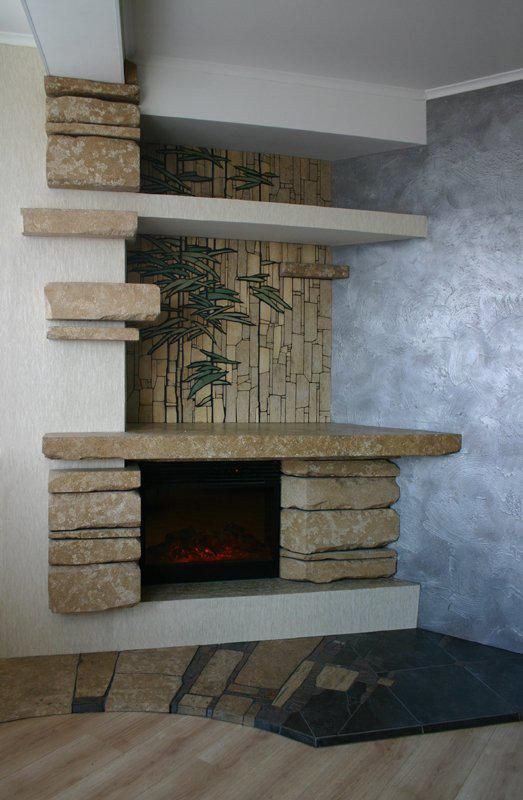 A corner fireplace with mosaic stone cladding to the ceiling and asymmetric design creates unique room character. The raised stone base serves as additional space for decor placement.
A corner fireplace with mosaic stone cladding to the ceiling and asymmetric design creates unique room character. The raised stone base serves as additional space for decor placement.
Natural stone mosaic requires professional installation, but the result justifies the costs. By the way, such a solution is especially effective in small rooms where every element should work for visual space expansion.
Fireplace in Wall Niche
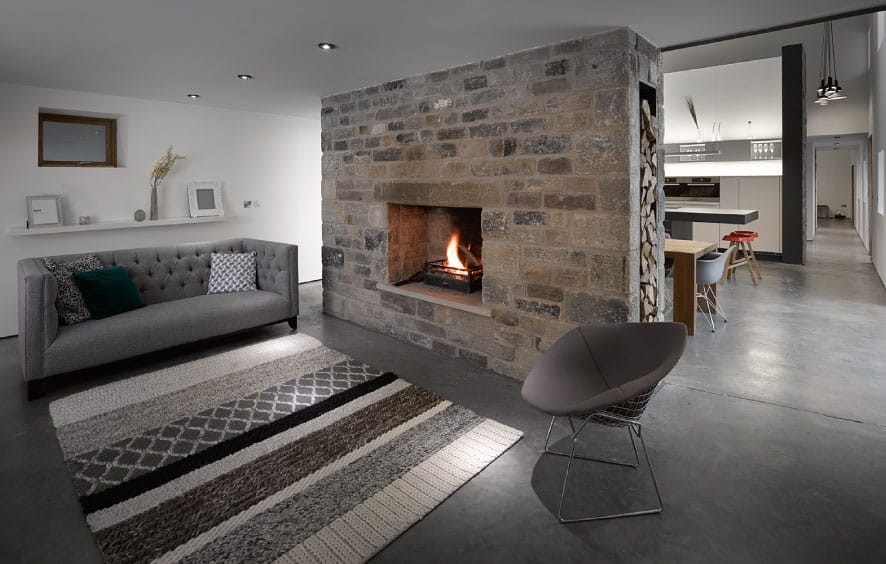 Placing a fireplace in a cutout section of the wall creates a room divider effect without complete space separation. It visually separates one zone from another while maintaining overall space unity.
Placing a fireplace in a cutout section of the wall creates a room divider effect without complete space separation. It visually separates one zone from another while maintaining overall space unity.
The niche becomes an architectural element that works even with the fireplace turned off. In practice working with private clients, this solution is often chosen for studio apartments.
High-Tech Solutions
Integration of modern technologies transforms the fireplace into a multifunctional entertainment and comfort center.
Electric Fireplace with Built-in Media Wall
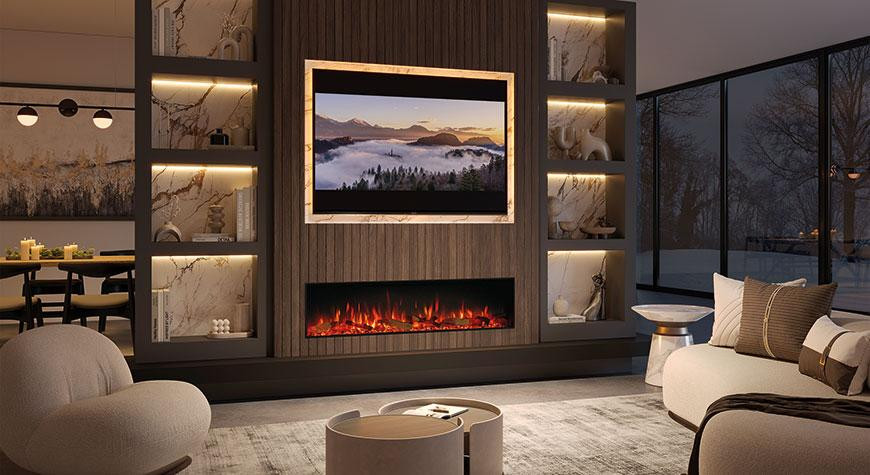
Dark metal panels above the hearth open, revealing a media wall with a television. The structure is perfect for watching movies by the fire.
The system includes overheating protection and automatic ventilation control. This way, technology safely combines with live fire.
Individual Laser-Cut Designs
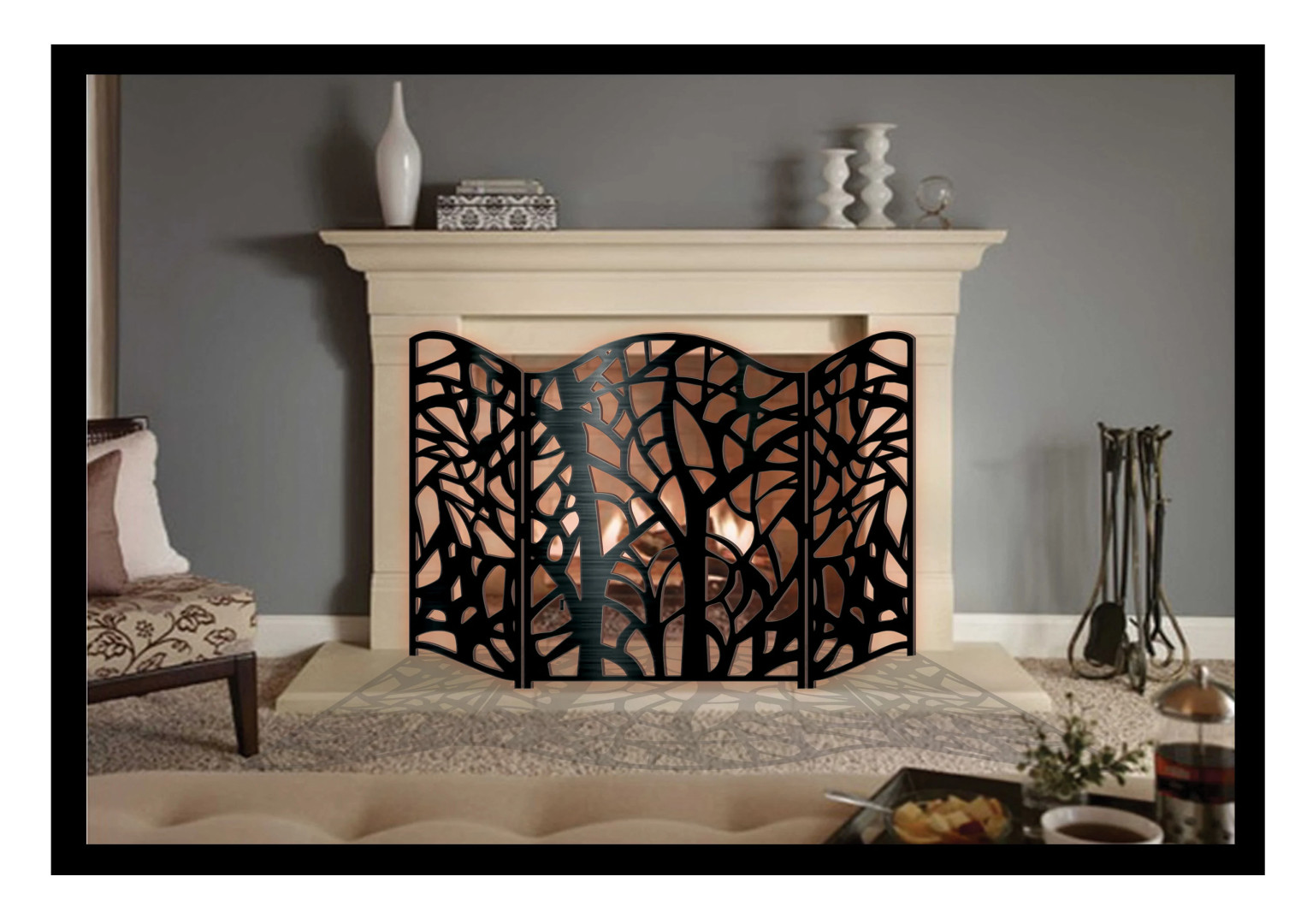 Laser cutting allows creating unique patterns for fireplace doors and screens. From geometric ornaments to complex artistic compositions.
Laser cutting allows creating unique patterns for fireplace doors and screens. From geometric ornaments to complex artistic compositions.
The technology works with various metals – from steel to brass. Each project becomes an exclusive work. It's not always easy to find qualified performers, but the result is worth it.
"I'm often asked about the compatibility of high technology and live fire. Modern safety systems allow integrating electronics even into wood-burning fireplaces. The main thing is to follow manufacturer requirements and not economize on component quality." – Michael Johnson, fireplace systems engineer.
Unconventional Color Solutions
The color of a fireplace can dramatically change the character of the entire room. Modern designers experiment with the most unexpected combinations.
Bio-Fireplace with Contrasting Design
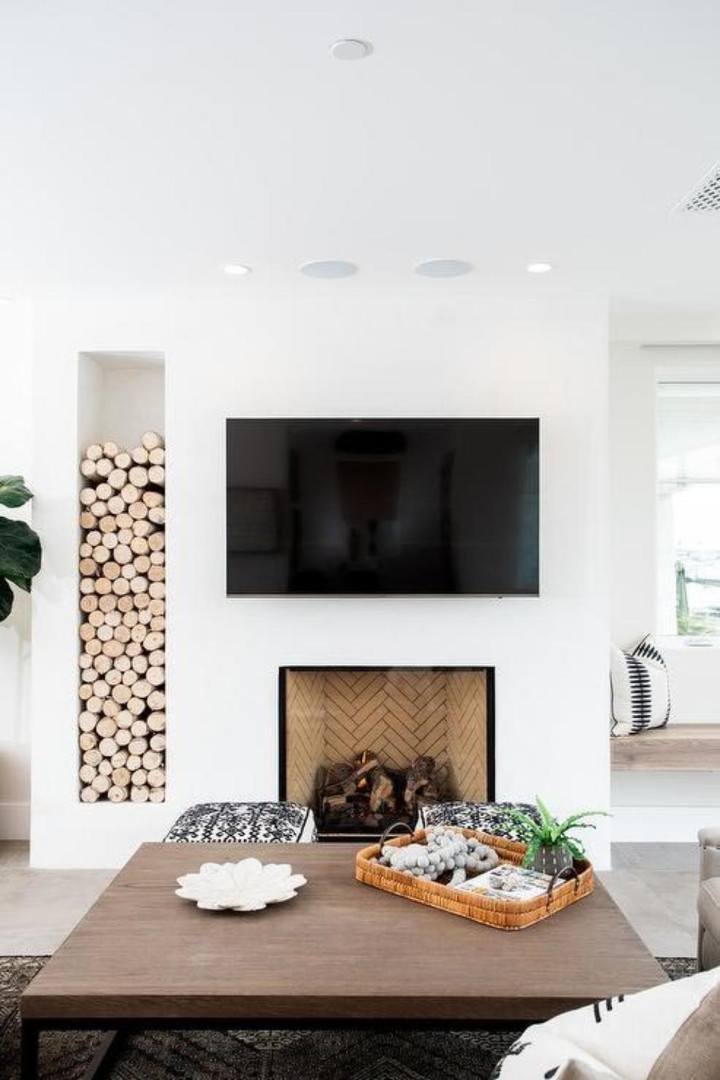 A dark hearth on a light wall creates a dramatic effect. Such a solution makes the structure the main accent of the room.
A dark hearth on a light wall creates a dramatic effect. Such a solution makes the structure the main accent of the room.
In Scandinavian interiors, black bio-fireplaces on white backgrounds are often used. The contrast emphasizes the geometry of the structure and creates a graphic composition.
Wood-Burning Fireplace with Copper-Fire Effect
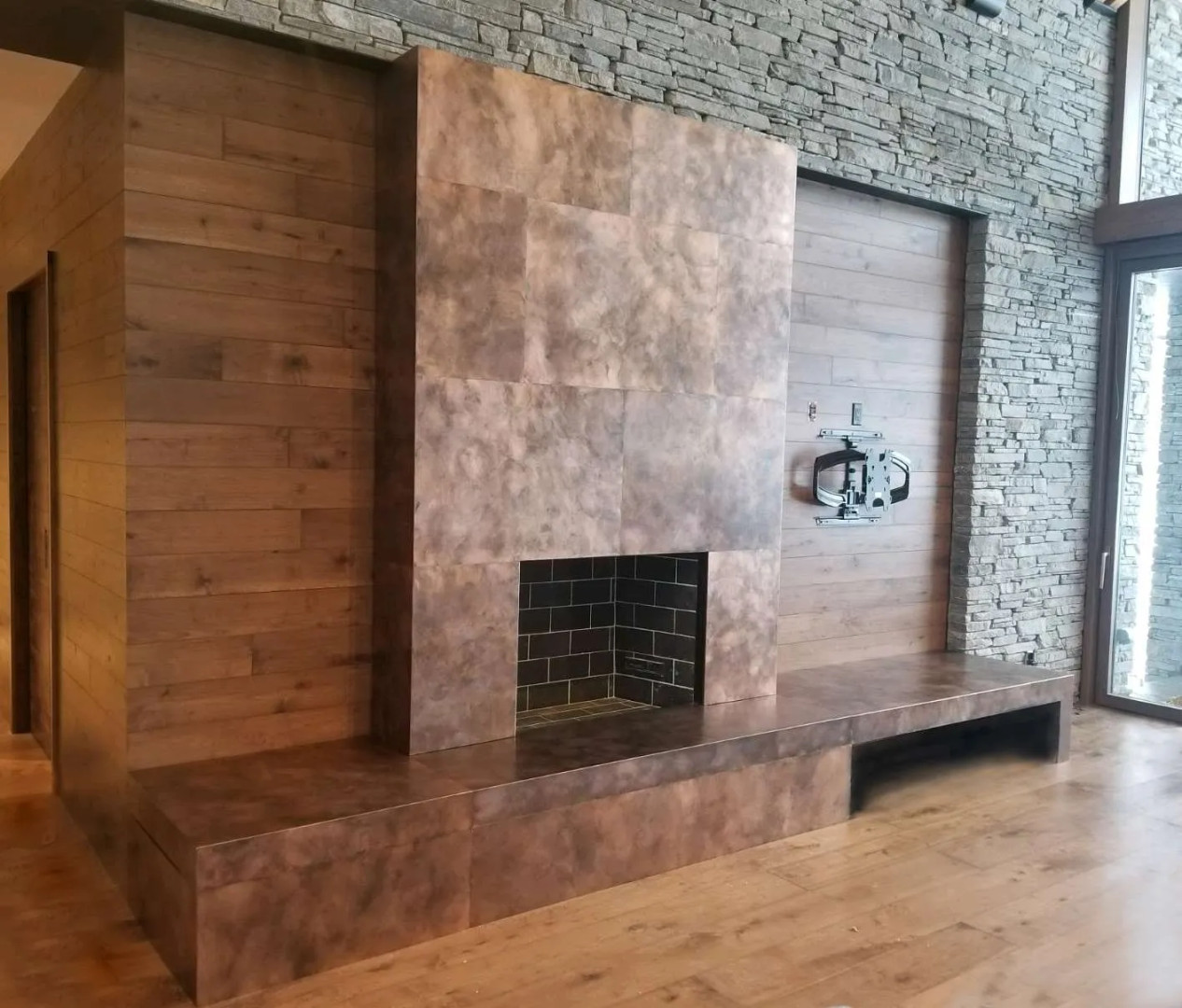 Copper plates or ceramic tiles in corresponding shades create an effect of unity with fire. The copper-fire cocktail is especially effective in bar areas.
Copper plates or ceramic tiles in corresponding shades create an effect of unity with fire. The copper-fire cocktail is especially effective in bar areas.
On one object last season, we integrated a modern fireplace into a bar counter with copper finishing. Guests were delighted with the unusual solution – cocktails were served literally under live flames.
Practical Cases of Successful Projects
Real examples demonstrate how unconventional ideas work in life.
"We wanted to create something special in our loft. The designer suggested a suspended Gyrofocus fireplace in the center of the space. At first, the idea seemed crazy, but the result exceeded expectations. Now it's the heart of our home – we can turn the fireplace in any direction depending on where we gather. In summer it becomes an art object, and in winter it warms the whole family. Installation cost $18,000, but every cent was worth it."
Loft in Former Factory
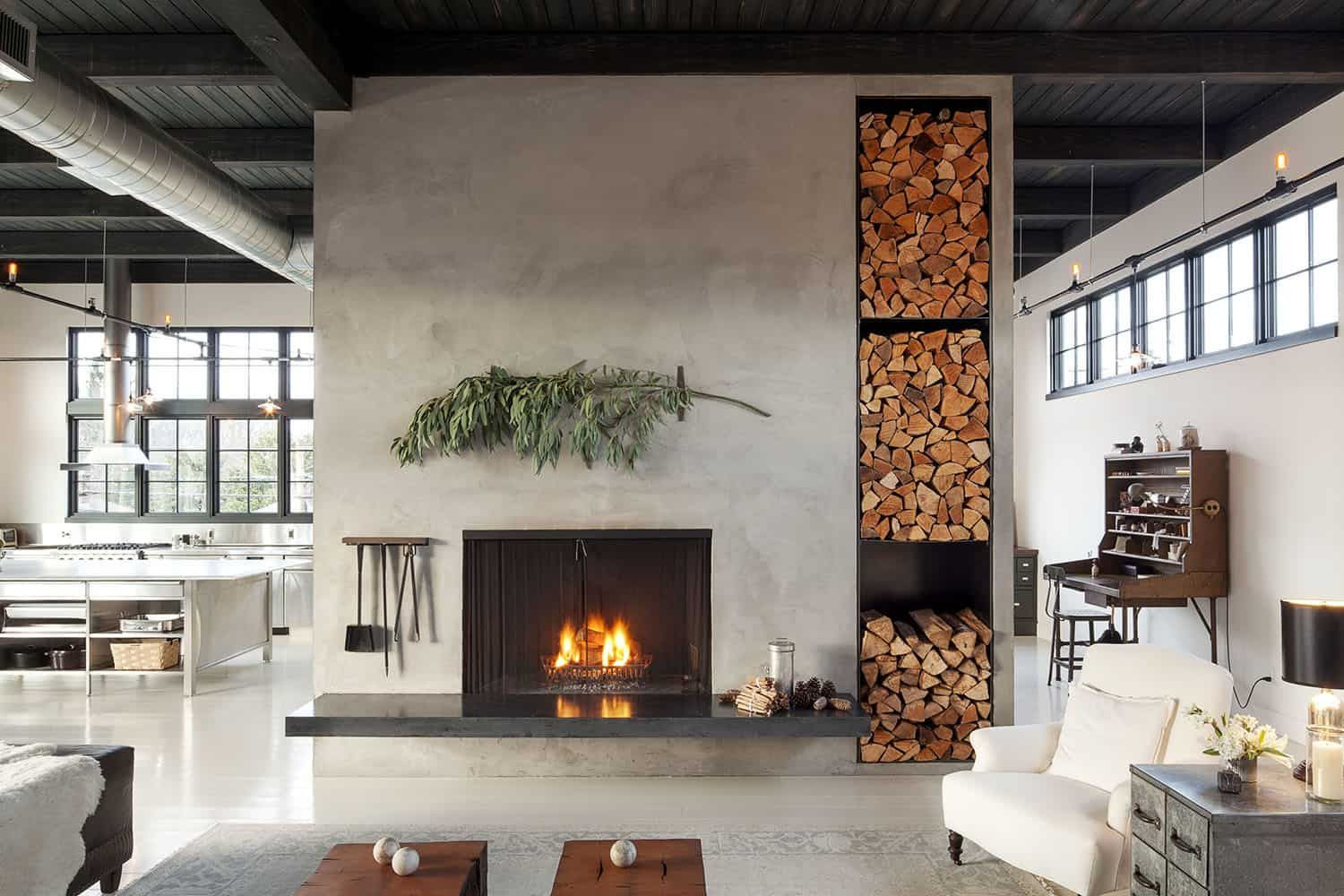 Area: 120 sq.m, ceiling height: 4.5 m. Solution: suspended Drop fireplace in industrial style. Result: the structure became the sculptural center of the space without disrupting the openness of the layout.
Area: 120 sq.m, ceiling height: 4.5 m. Solution: suspended Drop fireplace in industrial style. Result: the structure became the sculptural center of the space without disrupting the openness of the layout.
Project cost: $15,000 including installation and chimney. Implementation time: 6 weeks from order to launch.
Country House in Mid-Century Style
A fireplace divider with asymmetric cubes separated the kitchen and living room while maintaining visual connection. One cube is clad with refractory concrete, the second with aged steel.
The structure works as both a functional element and a work of art. It should be noted that such solutions require individual design for specific spaces.
The following table will help choose the optimal solution depending on room type.
| Room Type | Recommended Solution | Implementation Features | Approximate Cost |
|---|---|---|---|
| Studio Apartment | Suspended cone fireplace | Compactness, doesn't occupy floor | $8,000-12,000 |
| Loft | Drop fireplace | Industrial aesthetics | $12,000-20,000 |
| Country House | Fireplace divider | Space zoning | $10,000-25,000 |
| Townhouse | Ribbon fireplace | Visual height increase | $6,000-15,000 |
The correct choice of fireplace type determines the success of the entire project and comfort of operation.
Safety of Unconventional Solutions
Creative ideas require special attention to safety issues. Each unconventional solution must comply with fire safety requirements.
Requirements for Suspended Structures
Suspended structures require professional calculation of load-bearing capacity. The design load is 500-800 kg considering safety factors and dynamic loads. Local building codes regulate requirements for suspended structure fasteners.
Mandatory safety elements: steel cable with five-fold safety margin, duplicate fastening, fire barriers at ceiling penetration points, carbon monoxide (CO) sensors with automatic shutdown. It should be noted that ceiling height must be at least 3.5 meters considering 60 cm fire safety clearances above.
Mandatory elements: steel cable with 5x safety margin, duplicate fastening, emergency gas shutoff system (for gas models).
Ventilation Features
Unconventional fireplace placement requires individual ventilation calculation. Suspended models create special air flows that must be considered during design.
Considering structural features, it's recommended to install an air quality control system with automatic shutdown when permissible CO concentrations are exceeded.
Care for Unconventional Fireplaces
Unusual structures require a special approach to maintenance and care.
Suspended Models
Cleaning suspended fireplaces requires special equipment. Annual inspection of fasteners is mandatory. Access to the chimney may be limited, which increases maintenance costs by 30-50%.
Glass Surfaces
Ceramic glass requires special cleaning agents. Regular glass cleaners can leave residue at high temperatures. A mixture of white vinegar and water is recommended.
"Unconventional fireplaces require more frequent professional maintenance, but this is compensated by their uniqueness and effectiveness. The main thing is not to economize on installation quality and regular inspections." – John Smith, fireplace service specialist.
Trends 2025-2026: What Will Be Popular
The fireplace industry is developing at a rapid pace. Current fireplace design trends 2025 show growing popularity of interactive and technological solutions.
Smart Fireplaces with Voice Control
Integration with smart home systems allows controlling the fireplace by voice or through a mobile app. Air quality sensors automatically regulate combustion intensity.
Eco-Friendly Biofuel Solutions
Biofuel is becoming the main alternative to wood in urban conditions. The absence of smoke and ash, ease of installation, and environmental friendliness make bio-fireplaces increasingly popular.
Modular Structures
The ability to change fireplace configuration depending on season or mood. Modular elements allow creating different compositions from the same components.
Conclusion: Creating the Perfect Atmosphere
Modern fireplace art has moved far from traditional concepts of home hearth. Suspended spheres floating in air, fireplace dividers dividing space into zones, gradient glass panels changing color from flame heat – all this is no longer fantasy but accessible reality.
The main discovery of modern fireplace construction: fire can exist at any point in space. Ceiling mounts free up walls and floors, double-sided structures unite different zones, and innovative materials allow creating forms unimaginable just a decade ago.
Each of the presented solutions has been tested in practice and has real implementation examples. From a modest budget of $6,000 for a ribbon fireplace to exclusive $25,000 for Gyrofocus – there are options for any possibilities.
It should be noted that unconventional solutions require more careful planning and qualified execution. But the result justifies the efforts: your fireplace becomes not just a heat source but a work of art, a center of attraction, and an object of guest admiration.
When choosing between tradition and innovation, remember: the best fireplace is one that reflects your individuality and creates exactly the atmosphere you want to see in your home. In the world of modern technologies and materials, limitations exist only in our imagination.
